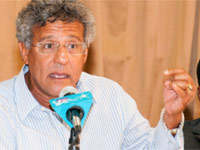NASSAU, The Bahamas — CARICOM Member States are “particularly vulnerable and susceptible to the risks and threats posed by weapons of mass destruction and terrorism” by virtue of their small size, geographical configuration and limited technical and financial resources, Deputy Prime Minister and Minister of Foreign Affairs the Hon. T. Brent Symonette said Tuesday.
Mr. Symonette said the same vulnerability is the cause of the scourge of illicit drugs, gun and human smuggling CARICOM Member States are “currently experiencing.” He urged countries to “close the security gaps and ensure that effective and responsive monitoring systems are established.”
The Deputy Prime Minister said combating the proliferation of chemical, biological, regional, nuclear (CBRN) is of paramount importance all international and regional countries as all states are vulnerable to this ongoing challenge.
“This is particularly so for small-island states which can be seen as soft, unsuspecting targets for would-be terrorists and which lack adequate controls and sophisticated know-how to detect the ingenious smuggling of weapons of mass destruction,” Mr. Symonette added.
Addressing delegates attending the Regional Workshop on the Implementation of the Chemical Weapons Convention for Policy Officials from CARICOM Member States which opened Tuesday in New Providence, the Deputy Prime Minster said small-island states’ vulnerability to terrorist attacks was clearly demonstrated in the aftermath of the 911 attacks on the United States of America.
“The security and economic viability of the international system are indeed inextricably intertwined (as) while none of these events occurred on Caribbean soil, the region realised significant economic losses to the tune of nearly one billion dollars and the losses of hundreds of thousands of jobs in the tourism and hospitality sector,” Mr. Symonette said.
“Given the reality that terrorist events do transcend borders, it is critical that a cooperative approach in controlling and managing the global trade in strategic goods and dual-use materials be forged and that small states, including CARICOM nations, understand and embrace their consequential role and attendant responsibilities in this effort,” he added.
The Deputy Prime Minister said any “significant lack” in the capacity to prevent contraband from entering the domestic environment and international supply chain must be addressed.
Capacity gaps, Mr. Symonette said, considerably increase the threat of weapons of mass destruction and their precursors entering the international supply chain. Gaps in our capacities to patrol and secure our territorial waters and coastlines increase the likelihood of terrorists gaining access to perpetuate their nefarious activities,” he added.
Mr. Symonette said regional export control architecture remains “out of step” with the threats and strategic environment it currently faces.
“Limited personnel and infrastructure resources, porous borders and socio-economic realities, exacerbated by the recent global economic crisis, all serve to compound existing transit and transshipment challenges, complicate enforcement of effective, non-proliferation policies, and inhibit efforts to institutionalise regional inter-agency cooperation,” Mr. Symonette said.
While the Caribbean’s “spans” of major shipping lanes from South America and Europe is one of the region’s “greatest assets for exploiting opportunities for economic trade and development,” Mr. Symonette said its “geographical position and construct” increases its vulnerability to attacks and pose even greater security challenges.
“It is imperative that we close security gaps and ensure that effective and responsive monitoring systems are established,” Mr. Symonette added.
By Matt Maura
Bahamas Information Services


